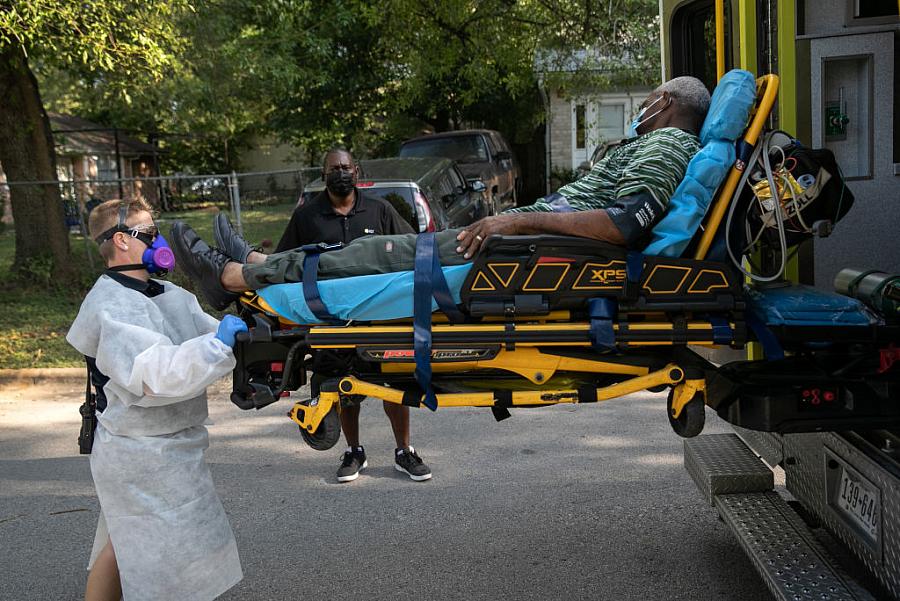Public recognition of health inequities has faded from last year, survey finds

Medics transport a man with COVID-19 symptoms to the hospital in August 2020 in Austin, Texas.
(Photo by John Moore/Getty Images)
As anti-racism and social justice demonstrations swept the country in the summer of 2020 amid a devastating pandemic, many Americans decried health and other disparities for people of color.
But, more than a year later, the public’s acknowledgment of these inequities dropped significantly, indicating that the shift in public opinion may have been temporary.
That’s a key finding from a new RAND Corporation survey funded by the Robert Wood Johnson Foundation (also a funder of the Center for Health Journalism’s National Fellowship) that examined 1700 people’s attitudes toward COVID, health and disparities. The findings suggest the increased recognition may have simply reflected a moment in time and not a longer-lasting shift in the public understanding of racial inequities, researchers say.
“Many thought we had reached a point where there would be a change in Americans’ views, that more people would start to recognize the injustices in our society,” said Katherine Grace Carman, a senior economist at RAND and lead author of the survey. “The big drop suggests that some of that recognition is fading over time.”
Inequities and awareness
A growing body of academic research has highlighted the stark health disparities between people of color and white individuals in the United States. But the pandemic made such gaps brutally apparent on a far broader scale, as groups such as Blacks, Hispanic and American Indians faced a disproportionate number of COVID cases and death. The survey sought to better understand how the public’s perceptions of these COVID-related disparities may be evolving.
In July 2020, about 61% of people agreed that people of color such as African Americans and Latinos face greater health impacts from COVID than whites. In September 2021, though, that fell to just 53%.
An 8% decline in just over a year is a significant and meaningful shift, Carman said. To put it another way, imagine if a candidate’s poll figures dropped by 8%. That would reflect a clear change in support, she pointed out.
The survey numbers also fell to a lesser extent for related questions such as whether people of color felt more of the pandemic’s financial impact, or whether poorer health outcomes from coronavirus are linked to systemic racism. The downward trend across these related questions supports the idea that there’s a larger mindset shift taking place, she said.
While the survey doesn’t ask people to explain their responses, a look at the historical context offers clues. At the time of the first survey, there were still widespread shutdowns and unprecedented attention to systemic racism and inequalities. Throughout the summer of 2020, demonstrations and discussions about systemic racism were common, and it makes sense that those events shaped people’s responses. The most recent survey came this past September, at a time when many people were embracing a return to normalcy with schools and businesses open.
“Today, it’s not in the forefront,” Carman said. “What could have been a permanent shift was just a moment in time.”
Other noteworthy findings
While participants’ acknowledgment of health inequities by race declined over time, that wasn’t the case for other disparities. In fact, even more people said it was harder for rural residents to access “the care they need” in the latest survey, from nearly 60% in July 2020 to about 64% in September.
Similarly, two-thirds of participants noted financial barriers to care, a figure that dropped just slightly from the first survey.
Among other noteworthy findings: There was a high level of support (65%) for sending COVID vaccines to other countries. That question was posed in September before knowledge of the omicron variant.
“Now I would think the number would be even higher,” Carman said.
Rand/RWJF created the multipart survey to gauge the impact of living through the pandemic and whether it would change deep-seated beliefs around health and systemic racism. The findings underscore just how entrenched views about race and racism can be.
Carman said she hopes the recognition that changing beliefs about systemic racism is a “slow-moving process” will stir further discussions and awareness. That, in turn, can influence public policies.
“If you want to have policies that address inequities, we need to have a population that supports these policies,” she said. “It’s really important that people understand inequities exist.”
**

